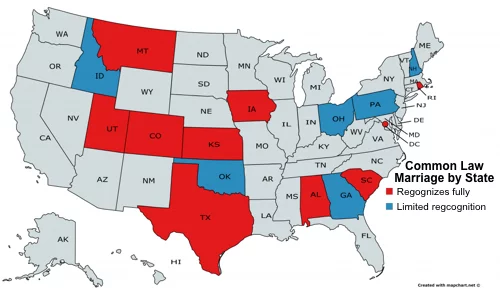Common Law Marriage States: What You Need to Know

While common law marriage is not recognized in every state in the US, there are several states that do recognize it. In this article, we will take a closer look at common law marriage states, what they are, and what you need to know if you are considering entering into a common law marriage.
What is Common Law Marriage?
Common law marriage is a legal concept that has been recognized in some states for many years. In essence, it is a way for couples who live together and present themselves as married to be recognized as legally married without actually having to go through a formal ceremony or obtain a marriage license.
Under common law marriage, the couple must meet certain requirements in order to be recognized as legally married. These requirements can vary from state to state, but generally include:
- The couple must live together for a certain period of time (usually several years)
- The couple must hold themselves out to others as being married
- The couple must intend to be married
If these requirements are met, the couple may be recognized as legally married under common law marriage.
Common Law Marriage States
Not all states in the US recognize common law marriage. In fact, only a handful of states currently recognize it. These states include:
| State | Year Recognized |
|---|---|
| Alabama | 1901 |
| Colorado | 1877 |
| Georgia | 1997 |
| Idaho | 1864 |
| Iowa | 1839 |
| Kansas | 1859 |
| Montana | 1865 |
| New Hampshire | 1877 |
| Ohio | Common law marriage recognized prior to 1991 |
| Oklahoma | 1890 |
| Pennsylvania | Common law marriage recognized prior to 2005 |
| Rhode Island | Common law marriage recognized prior to 1896 |
| South Carolina | Common law marriage recognized prior to 1950 |
| Texas | Common law marriage recognized prior to 2005 |
| Utah | Common law marriage recognized prior to 2005 |
It is important to note that even in states that do recognize common law marriage, not all couples who meet the requirements will be considered legally married. Each case is evaluated on a case-by-case basis, and there are many factors that can affect whether or not a couple is recognized as legally married under common law marriage.
How Does Common Law Marriage Affect Your Legal Rights?
Whether or not you are considered legally married under common law marriage can have a significant impact on your legal rights. For example, if you are considered legally married under common law marriage, you may be entitled to:
- Spousal support
- Property rights
- Inheritance rights
- Health insurance benefits
- Social security benefits
However, if you are not considered legally married under common law marriage, you may not be entitled to these benefits. It is important to understand your legal rights and obligations if you are considering entering into a common law marriage.
FAQs
1. What is the difference between common law marriage and traditional marriage?
The main difference between common law marriage and traditional marriage is that traditional marriage requires a formal ceremony and a marriage license, while common law marriage does not. In a traditional marriage, the couple is legally married as soon as they obtain their marriage license and have their ceremony. In a common law marriage, the couple is legally married after they have met certain requirements and are recognized as married by the state.
2. What are the requirements for common law marriage?
The requirements for common law marriage can vary from state to state, but generally include living together for a certain period of time, holding yourselves out to others as being married, and intending to be married.
3. If I move to a state that recognizes common law marriage, do I automatically become common law married?
No, simply moving to a state that recognizes common law marriage does not automatically make you common law married. You must still meet the requirements for common law marriage in that state in order to be recognized as legally married.
4. Can I get a divorce if I am in a common law marriage?
Yes, if you are in a common law marriage and you want to end the relationship, you will need to get a divorce just like you would in a traditional marriage. The process for obtaining a divorce will vary depending on the state you live in and the specific circumstances of your relationship.
The Pros and Cons of Common Law Marriage
Pros:
- You can be recognized as legally married without having to go through a formal ceremony or obtain a marriage license
- You may be entitled to certain legal benefits if you are recognized as legally married
- You may have more flexibility in your relationship than you would in a traditional marriage
Cons:
- Not all states recognize common law marriage
- Even in states that do recognize it, not all couples who meet the requirements will be considered legally married
- You may not be entitled to certain legal benefits if you are not recognized as legally married
- You may have more difficulty ending the relationship than you would in a traditional marriage
Conclusion
Common law marriage is a legal concept that is recognized in some states in the US. If you are considering entering into a common law marriage, it is important to understand the requirements for common law marriage in your state and how it may affect your legal rights and obligations. While there are some benefits to common law marriage, there are also some drawbacks, so it is important to carefully consider your options before making a decision.
